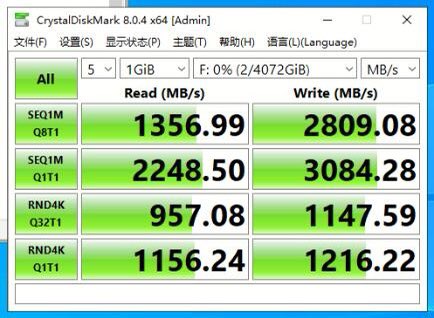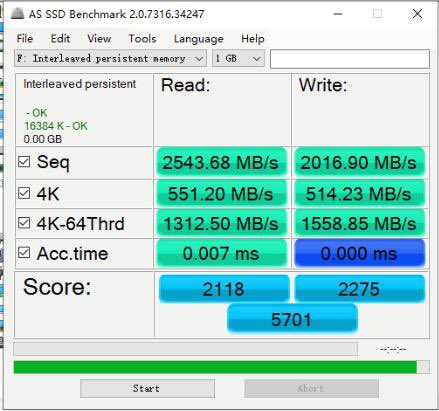Intel 3rd Generation Optane DC PM Modules 'Crow Pass' Tested
Intel's Optane DC Persistent Memory modules with DDR5 interface benchmarked.
A renowned hardware blogger has gained access to engineering samples of Intel's 4th Generation Xeon Scalable Sapphire Rapids processor and Intel's 3rd Generation Optane DC Persistent Memory 'Crow Pass' modules. Unfortunately, engineering samples of upcoming hardware do not always perform like commercial parts, which seems to be the case here. But there are several important points to mention.
Hardware bloggers, leakers, and big Intel clients have been playing with engineering samples of Intel's 4th Generation Xeon Scalable Sapphire Rapids CPUs for some time. So it's not surprising since Intel has been shipping QVL samples of these processors for months now. Yuuki_Ans, a well-known hardware collector with access to rare parts, is the first to obtain Intel's next-generation Optane DC Persistent Memory modules codenamed Crow Pass that use a DDR5 interface. The fact that the blogger got these modules is important as it proves that Intel is sampling its 4th Generation Optane DC Persistent Memory modules with select clients. So there are good chances that the company does not have plans to drop the technology for now.
While even getting 4th Generation Optane DC Persistent Memory modules was a big deal, Yuuki_Ans tried to test them and even posted benchmark results on his Twitter.


Intel's Optane DC Persistent Memory modules are not the hottest products on the market. However, they cater to particular server workloads and increase near-CPU memory capacity significantly below the price of appropriate traditional memory modules. To that end, you will not find many reviews of Optane DC Persistent Memory modules on the Web. Yet, we compared LegitReview's results of Intel's 1st Generation Optane DC Persistent Memory 'Apache Pass' to Yuuki_Ans's results of Intel's 3rd Generation Optane DC Persistent Memory 'Crow Pass.'
Performance of Intel Optane DC PM Modules in CrystalDiskMark
| Header Cell - Column 0 | 3rd Gen Optane PM 'Crow Pass' | 1st Gen Optane PM 'Apache Pass' | 3rd Gen Optane PM 'Crow Pass' | 1st Gen Optane PM 'Apache Pass' |
|---|---|---|---|---|
| Row 0 - Cell 0 | Read | Read | Write | Write |
| Sequential 1M | Q1T1 | 2248.5 MB/s | 3634.8 MB/s | 3084.28 MB/s | 1803.37 MB/s |
| Random 4K | Q1T1 | 282,226 IOPS | 437,539 IOPS | 298,875 IOPS | 471,482 IOPS |
| Data by | Yuuki_Ans | LegitReviews | Yuuki_Ans | LegitReviews |
As it turns out, Intel's 3rd Gen Optane DC PM modules working with Intel's Xeon Scalable Sapphire Rapids processor are slower than Intel's 1st Gen Optane DC PM modules paired with 2nd Gen Xeon Scalable Cascade Lake CPU.
Of course, we are dealing with results obtained in only one benchmark using pre-production hardware, so take them with a grain of salt. Furthermore, from time to time, companies supply their pre-production parts with firmware and microcodes that deliberately lower performance to allow rivals to evaluate the performance of future hardware before release.
In any case, the key takeaway is that Intel is sampling its 3rd Generation Optane DC Persistent Memory modules and plans to offer the technology with its next-generation Xeon Scalable 'Sapphire Rapids' platforms.
Get Tom's Hardware's best news and in-depth reviews, straight to your inbox.

Anton Shilov is a contributing writer at Tom’s Hardware. Over the past couple of decades, he has covered everything from CPUs and GPUs to supercomputers and from modern process technologies and latest fab tools to high-tech industry trends.
-
twotwotwo I don't think I heard of any use of the first-gen persistent memory modules out in the wild, and Micron wanting out of the manufacturing side of it suggested things didn't look great from that perspective. It'd be exciting to have something out there that's slower but can be made and sold at a cost per GB low enough to make it relevant!Reply -
FrostByteVA I have the second gen PMem/Ice Lake in an ESXi host running SQL VMs. For us, the PMem reduces cost by requiring less RAM in a system. You essentially are using PMem for over-provisioning RAM instead of relying on swap. That said in our testing of 1:2 RAM:PMem ratios, the DBAs did not report performance issues and I was able to lower the cost of a system by 10%. In this use case, the performance of the PMem is not critical since it is all cold memory.Reply -
twotwotwo ReplyFrostByteVA said:I have the second gen PMem/Ice Lake in an ESXi host running SQL VMs. For us, the PMem reduces cost by requiring less RAM in a system. You essentially are using PMem for over-provisioning RAM instead of relying on swap. That said in our testing of 1:2 RAM : PMem ratios, the DBAs did not report performance issues and I was able to lower the cost of a system by 10%. In this use case, the performance of the PMem is not critical since it is all cold memory.
It's neat to hear there are uses of it out there!